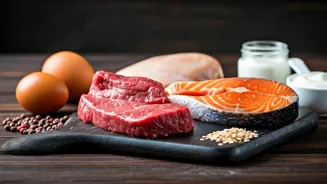Protein Powerhouses
Protein is the cornerstone of muscle growth, so it’s vital to load up on protein-rich foods. Lean meats like chicken breast, turkey, and lean cuts of beef
are excellent sources, delivering not only protein but also essential amino acids for muscle repair and growth. Fish, especially salmon, is also a fantastic choice. It's loaded with protein and omega-3 fatty acids, which help reduce inflammation and support overall health. Eggs, often considered a complete protein, provide a full range of amino acids, making them a convenient and versatile option. Don't forget about plant-based protein options like lentils, chickpeas, and tofu; they are great for variety and ideal if you're looking for vegetarian or vegan alternatives. Consider protein supplements such as whey or casein to ensure you are meeting your daily protein intake, especially after workouts. Always remember to spread protein intake throughout the day for best results.
Complex Carbohydrates
Complex carbohydrates provide the fuel needed to power your workouts and replenish glycogen stores after exercise. Sweet potatoes offer a substantial dose of carbohydrates, alongside essential vitamins and minerals. Oats are another excellent choice; they deliver sustained energy, keeping you fuelled for longer durations and preventing energy crashes. Brown rice provides a steady release of glucose, supporting both workouts and overall health. Quinoa is a complete protein and a good source of carbohydrates, adding extra nutrients to your diet. Whole-grain bread and pasta provide fibre and essential nutrients, which improves your digestion and supports muscle-building efforts. Focus on incorporating complex carbohydrates into meals before and after workouts to maintain energy levels and support muscle recovery. Remember to consider your activity level when adjusting carbohydrate intake to suit your needs.
Healthy Fats Matter
Healthy fats are crucial for hormone production, including testosterone, which supports muscle growth. Avocados are packed with monounsaturated fats and provide fiber and essential nutrients to support muscle health. Nuts like almonds, walnuts, and cashews are great sources of healthy fats, protein, and fiber. Olive oil is high in monounsaturated fats and supports overall health and well-being. Fatty fish, such as salmon and mackerel, which are abundant in omega-3 fatty acids, can reduce inflammation and assist with muscle recovery. Coconut oil offers medium-chain triglycerides (MCTs), which your body can quickly convert into energy. Incorporate healthy fats into your diet to support hormone balance and enhance muscle growth. Avoid excessive intake of saturated fats and opt for healthier alternatives to promote better results and overall health.
Fruits and Vegetables
Fruits and vegetables are vital for their vitamins, minerals, and antioxidants, which support muscle function and recovery. Berries are full of antioxidants and are great for reducing oxidative stress, which can damage muscle tissue. Spinach, kale, and other leafy greens contain essential vitamins and minerals that improve muscle health. Bananas provide carbohydrates for energy and potassium to prevent muscle cramps. Apples, oranges, and other fruits offer essential nutrients, helping you stay healthy and active. Vegetables such as broccoli, cauliflower, and bell peppers provide a wealth of nutrients. Aim to eat a wide variety of colourful fruits and vegetables every day to provide your body with the necessary nutrients to support muscle growth and overall health.
Hydration is Key
Staying hydrated is essential for all bodily functions, including muscle growth and recovery. Water is essential for transporting nutrients to muscles and removing waste products. Drinking enough water helps your muscles perform at their best, improving your workout performance. Coconut water provides electrolytes, which are crucial for muscle function and preventing cramps. Herbal teas, such as green tea and chamomile, provide antioxidants and hydration. Ensure you stay hydrated, particularly during and after workouts, and drink water throughout the day. Dehydration can hinder muscle growth and recovery, so make drinking water a constant part of your routine for best results.
Foods to Limit
Certain foods can slow down muscle-building efforts, so it is important to limit their consumption. Processed foods often contain unhealthy fats, high amounts of sodium, and a lack of nutrients, which can impede muscle growth. Excessive sugar can lead to inflammation and hinder muscle recovery, so you should minimize the consumption of sugary drinks and snacks. Avoid foods high in saturated fats and trans fats, as these can increase inflammation and slow down muscle growth. Excessive alcohol can interfere with protein synthesis and hormone production, which are essential for muscle growth. Limiting these foods will help you stay on track with your fitness goals, and maximize your results. Focus on consuming whole, unprocessed foods to fuel your body effectively and reach your muscle-building goals.












